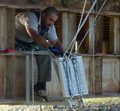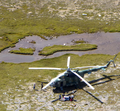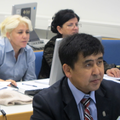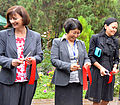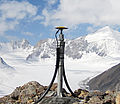CAWA Training Course "Use of GIS Techniques in Natural Resources Management"
From December 10th to 14th, 2012, a training course with focus on GIS techniques for natural resource management was hold at GFZ in Potsdam. The CAWa project invits specialists of the Central Asian hydrometeorological services, research institutions and water management organisations to participate in the course. This course was organized in cooperation with the Central Asian Institute for Applied Geosciences CAIAG.
Two monitoring stations started operation in Tajikistan
Two permanent hydrometeorological monitoring stations have been installed in Tajikistan in the end of May / early June, 2012. The stations Dupuli and Ayvadzh are located in the western and southern most reaches of Tajikstan, near the borders to Uzbekistan, and Afghanistan, respectively. A team of scientists and technicians from Tajik Hydromet, CAIAG, and GFZ installed the stations and put them into operation.
New land cover products for Central Asia
Within the CAWa project, the team of the Land Surface Dynamics working group at the German Aerospace Center DLR/DFD has elaborated a set of new remote-sensing based, multi-temporal land cover products for the region of Central Asia. The products include (1) a land cover classification for the years 2001 and 2009, (2) water bodies for the period 2000-2010, (3) net primary productivity for Kazakhstan for the period 2003-2011, (3) daily snow cover for the period 2000-2011, and (4) a soil moisture product. The new data sets are the basis for current and future research activities focusing on change detection and the effects of atmospheric and terrestrial processes on land cover.
New mass balance measurements on Tien Shan and Alay glaciers
In a three week expedition in August 2012, a multi-national team of researchers from Kyrgyzstan, Germany, Switzerland and Austria measured the 2011/2012 ablation and accumulation on four glaciers in the Tien Shan and Alai mountains, among them the Golubin and the Abramov glaciers. The data will be used to compute the 2011/2012 mass balances of the glaciers.
CAWA Training Course "Remote Sensing for Hydrometeorological Monitoring"
From July 16th to 20th, 2012, a training course with focus on Remote Sensing for Hydrometeorological Monitoring was hold at GFZ in Potsdam. The CAWa project invited 17 specialists of the Central Asian hydrometeorological services, research institutions and water management organisations to participate in the course. This course was organized in cooperation with University of Würzburg Faculty of Geography and Geology Department of Remote Sensing.
Second Phase of the "Berlin Process" launched at "Blue diplomacy in Central Asia" conference
After four successful years of the Central Asia Water Initiative (the Berlin Process), German Foreign Minister Guido Westerwelle invited government representatives from Kazakhstan, Kyrgyzstan, Tajikistan, Turkmenistan and Uzbekistan to the two-day conference „Blue diplomacy in Central Asia”, taking place in Berlin, 7-8 March 2012. The participants took stock of the activities undertaken during Phase I of the Berlin Process and outlined the activities planned for Phase II sending a strong message: the political will exists to continue cooperating on transboundary water management in the region.
CAWA Technical Training "Installation, Operation and Maintenance of CAWa HyMet Hydrometeorological Monitoring Stations"
From December 5th to 9th, 2011, a technical training on installation, operation and maintenance of CAWa HyMet Hydrometeorological Monitoring Stations was hold at GFZ in Potsdam. The CAWa project invited 10 specialists from Afghanistan and Tajikistan to participate in the training.
CAWa Training "Climate Change Impact Assessment and Hydrological Modelling"
From December 12th to 16th, 2011, a training course with focus on hydrological modelling was hold at GFZ in Potsdam. The CAWa project invited 17 specialists of the Central Asian hydrometeorological services, research institutions and water management organisations to participate in the course. This course was organized in cooperation with United Nations Development Program (UNDP) Central Asia Climate Risk and Mitigation Programme, Uzbek Hydrometeorological Service and the University of Würzburg.
Official inauguration of the regional Hymet monitoring network in Bishkek
On Friday, 16 September 2011, GFZ and CAIAG presented the first part of the regional hydrometeorological monitoring network being established in the frame of the CAWa project. Representatives of the German Federal Foreign Office, the Ministry of Foreign Affairs of the Kyrgyz Republic, as well as the Kyrgyz Ministry of Emergency Situations participated in the official inauguration ceremony which was held in Bishkek.
Climate and glacier monitoring at Abramov glacier resumed
In the end of August 2011, a multi-national team of researchers went on expedition to the Abramov glacier in the Alai range, Southern Kyrgyzstan. The team installed a CAWa Hymet monitoring station near the glacier, performed initial GPS measurements on the glacier and installed ablation stakes. With these activities, climate and glacier monitoring is being resumed at Abramov glacier, where a permanent research station had been operated until summer 1999 when it was destroyed by a local guerilla group.

